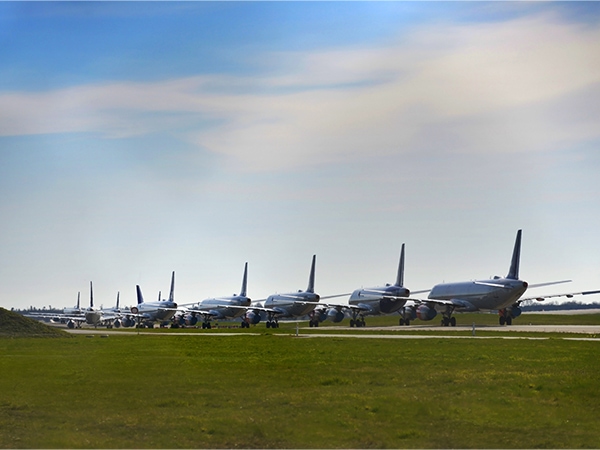30 October 2023
![]() 6 mins Read
6 mins Read

The ongoing COVID-19 pandemic continues to wreak havoc on our travel plans, as well as the tourism businesses and operators managing our bookings. Naturally, travellers want to know if they’re entitled to a refund from a travel agency if a COVID-19 outbreak postpones or cancels their holiday.
We asked our resident travel expert and Australian Traveller Media’s Managing Director Quentin Long and Virtuoso Travel Advisor and Inaugural Hall of Fame Winner Ann-Catherine Jones for their advice.

Ann-Catherine Jones is a travel agent and industry expert.
“The short answer is yes. How much and when, however, is a little bit trickier,” says Quentin Long.
The first thing to understand is that it isn’t as simple as getting the travel agent to transfer you back your funds. A fact that caused travel agents a world of pain a the start of the pandemic.
“Many customers were calling their travel agents demanding they give their money back. But the truth of the matter was, the agent didn’t have the money,” says Long.
Ann-Catherine Jones says all funds are immediately transferred to the various operators upon final payment. “We never hold the funds ‘in trust’.”
The Australian Federation of Travel Agents (AFTA) outlines that it can take up to 12 weeks for many airlines, cruise, tour companies and hotels to process refunds under normal circumstances. If applicable, travel agents will pass on the refund to you as soon as they have received the funds back from the supplier.
Ultimately, the terms and conditions (T&Cs) of your contract, with both the travel agent and the supplier, will determine what credit, refund or cancellation and service fees may be applied – but more on that later.

Countless flights have been grounded due to the COVID-19 pandemic.
In the current environment, it’s safe to expect delays. At the best of times it is a complicated process. Just think about the complexity of the booking says Long, “Airfares, hotels, tours, cruises – this all has to be consolidated and reconciled before being handed back to the client.”
“Just to understand the sheer complexity and scale, let’s take Emirates as an example. Pre-COVID they had the infrastructure to handle 35,000 refunds and credits a month. In July 2020 they had more than 500,000 to deal with. That is just one – admittedly large – airline,” says Long.
While the refund timeframe is dictated by the supplier, Jones says that travel agents are trying hard to turn these around faster.
“We are advocating for an overhaul of the lengthy timeframes some suppliers have in refunding us. Not only does this protect our travellers, but it also protects us as well.”
Put simply, yes. The Australian Competition and Consumer Commission (ACCC) has advised that if your travel is cancelled due to government restrictions, this changes your rights under the consumer guarantees.
According to ATAS, force majeure clauses can limit liability for the operator – something to look out for when reading the initial fine print. If this is not stipulated, the pandemic may allow for a ‘frustrated contract’ at common law or under legislation in some states. This allows ‘reasonable expenses’ to be deducted.
“Many travel agents’ sole source of income is the commission paid by the operator once the travel has been completed,” says Long.
When COVID-19 first hit, travel agents were working long hours on behalf of their clients’ to recoup the costs of cancelled holidays, but they also had to forgo their commission, which meant they were working for free.
In many cases, he adds, the extra leg work was costing them money. “They were incurring expenses – calling internationally and in their labour – to manage this process,” he says.
Like everyone else, travel agents deserve to be remunerated for their labour and cancellation or service fees may need to be part of that.
“I think we need to talk openly with the travel agents about service fees as [their time and expertise] is certainly worth it. You don’t want the hassle of managing all your cancellation T&Cs or credits should you need to cancel, or even the various credits when they are remitted to you.
“Who wants to hear, ‘We are experiencing an unusually high volume of calls. If your flight does not depart in the next 24 or 48 hours please call back another time,’ for six days straight? That’s worth a service fee in my book,” says Long.

Reading the terms and conditions is paramount before booking any travel.
According to Jones, the “blessing” of COVID-19 is that both travellers and travel advisors are more across T&Cs than ever before.
“We are very upfront with going through the scenarios and risks associated with them, but also in outlying exactly what our fees are in the case of cancellation and those of the supplier. People should be asking not only what the T&Cs are for the supplier, but what the T&Cs are for the agency. Our clients are also respectful of the impact that booking and rebooking repeatedly entails and are open to the small fees incurred if travel cannot proceed.”
She adds, “We always ask clients ‘what’s the Plan B’ if these arrangements are impacted by border closures? And tend to agree on a second set of dates should a worst-case scenario occur.”
For more specific information on pre-booking questions, visit our full explainer here.
“The value proposition for [booking with] a travel agent has never been greater,” says Long.
Snap lockdowns, border closures, flight cancellations and holiday postponements – a great travel agent will be abreast of all these occurrences in real-time.
Jones concurs. “The post-COVID travel landscape is going to be exceptionally different to what we are used to, and travellers will need a well-connected and resourceful travel advisor to help them navigate their options.”
In the case of a cancellation, a travel agent can also manage the entire process for you. Booking with a travel agent can make a painful process that much easier.
“We are anticipating limited availability on flights, in hotels, visa and vaccination regulations, and have the contacts to make things happen,” says Jones. “The reassurance of having a professional travel advisor at the end of the line to assist and advocate for you in the good times, and the not so great times is invaluable.”
LEAVE YOUR COMMENT